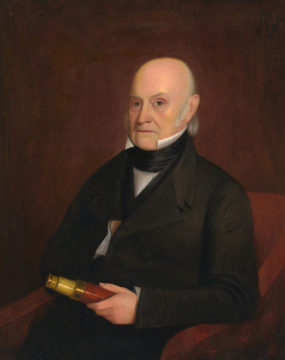by Michael Liss
However tiresome to others, the most indefatigable orator is never tedious to himself. The sound of his own voice never loses its harmony to his own ear; and among the delusions, which self-love is ever assiduous in attempting to pass upon virtue, he fancies himself to be sounding the sweetest tones. —John Quincy Adams, “Lectures on Rhetoric and Oratory: Delivered to the Classes of Senior and Junior Sophisters in Harvard University.”

Oh, my goodness, could that man talk. And talk. And talk some more. It might amuse you to know that, in the above quote, he was referring to his fellow lawyers.
So much you can say about John Quincy Adams. Annoying, crabby, bilious, voluble. Also, one of the most remarkable men ever to occupy the Oval Office—and even more to serve in the House of Representatives. A superb diplomat, who literally began his career at his father’s elbow prior to the negotiation of the Treaty of Paris, he served four Presidents (Washington, Adams I, Madison, and Monroe) as Ministers to the Netherlands, Russia, Prussia, and the UK. He was Monroe’s Secretary of State. During the wilderness that was Thomas Jefferson’s Presidency, he spent six years in the Senate. In typical Adams manner, he managed to irritate his own Federalist Party enough for them to deny him renomination. In 1824, he won the Presidency against three strong candidates, Andrew Jackson, Henry Clay, and William Crawford. None got a majority of the Electoral College, and the race was thrown into the House. There, Clay endorsed Adams, enraging Jackson supporters (who called it a “Corrupt Bargain” when Adams picked Clay for Secretary of State).
Adams was not as deft a President as he was a diplomat, and Jackson trounced him in a rematch in 1828, sending the then-61-year-old home to his failing farm in Massachusetts. He was not thrilled to be back in the Commonwealth; he sulked and became even more a pain until his own neighbors rescued him by sending him back to Washington as a Congressman. Read more »

 Port Sunlight was a model village constricted in the Wirral, in the Liverpool area, by the Lever brothers, and especially under the inspiration of William Lever, later lord Leverhulme. Their fortune was based on the manufacture of soap, and the village was built next to the factory in the Victorian/Edwardian era, for the employees and their families. It’s certainly a remarkable place, with different houses designed by various architects, parks, allotments, everything an Edwardian working class person might want. An enlightened employer, Lever was still a paternalist: he claimed his village was a an exercise in profit sharing, because “It would not do you much good if you send it down your throats in the form of bottles of whisky, bags of sweets, or fat geese at Christmas. On the other hand, if you leave the money with me, I shall use it to provide for you everything that makes life pleasant – nice houses, comfortable homes, and healthy recreation.” Overseers had the right to visit any house at any time to check for ‘cleanliness’ and that the rules about who could live in which house were observed (men and women could only share accommodation if they were in the same family). Still, by the stands of the day it was quite progressive – schools, art gallery, recreation of all sorts for the employees were important.
Port Sunlight was a model village constricted in the Wirral, in the Liverpool area, by the Lever brothers, and especially under the inspiration of William Lever, later lord Leverhulme. Their fortune was based on the manufacture of soap, and the village was built next to the factory in the Victorian/Edwardian era, for the employees and their families. It’s certainly a remarkable place, with different houses designed by various architects, parks, allotments, everything an Edwardian working class person might want. An enlightened employer, Lever was still a paternalist: he claimed his village was a an exercise in profit sharing, because “It would not do you much good if you send it down your throats in the form of bottles of whisky, bags of sweets, or fat geese at Christmas. On the other hand, if you leave the money with me, I shall use it to provide for you everything that makes life pleasant – nice houses, comfortable homes, and healthy recreation.” Overseers had the right to visit any house at any time to check for ‘cleanliness’ and that the rules about who could live in which house were observed (men and women could only share accommodation if they were in the same family). Still, by the stands of the day it was quite progressive – schools, art gallery, recreation of all sorts for the employees were important. 
